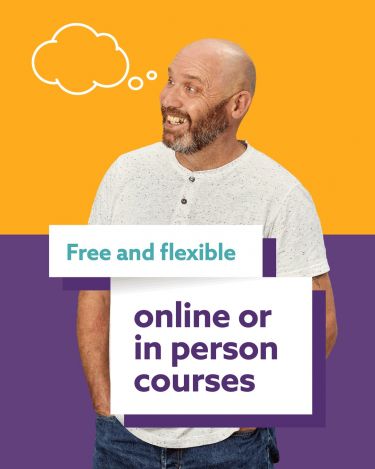10 ways WULF can help you carry on learning
Lifelong learning is something that lots of people talk about but not many people put into practice. Levels of participation have been steadily falling in Wales and across the UK for a number of years. However, learner numbers across WULF continue to grow. It is our view that this is due to a few fundamental principles on which WULF is built. Firstly, WULF projects are bespoke and co-designed along with working people. The key principle of WULF is that it is designed to remove barriers to participation for working people and it does just that. However, it also allows members and workers to tell us what they want to learn, and each project’s learning offer is informed by worker voice.
The second key principle is equality of access and opportunity. WULF has always been focused on engaging the hardest to reach. Working people often have enhanced barriers especially in terms of time, childcare and cost. Trade unions work with employers to ensure that no group or individual is excluded or left behind. They develop agreements and policies to ensure that WULF changes workplace cultures and embeds fairness in the workplace.
This was evident at the recent Adult Learners Week reception in the Senedd, where the success of WULF projects and their contribution to ALW was celebrated. Both the Unite and Unison projects won awards for the huge numbers of adult learners they have engaged in recent years and there was also a showcase (31:35) on GMB learner Mark Church and his amazing learning journey.
Help and support can be tailored to your individual needs, WULF is designed to remove barriers to learning and can deliver flexible options to suit you.
1.Health & Wellbeing
“How can WULF support my wellbeing?”
WULF projects can organise and pay for health and wellbeing courses. Popular courses like mindfulness, mental health awareness and finding out about green social prescribing are great, healthy choices.
During the height of the pandemic demand for health and wellbeing support skyrocketed, WULF now successfully delivers innovative online offers by supporting and helping people to cope.
The NEU recently developed and published a fantastic wellbeing toolkit specifically designed for the education sector.
The Wales TUC has an excellent catalogue of bite sized self-help ‘Coping with Covid’ tutorials designed to destress during the pandemic. Check them out, the sessions have useful tips and tricks delivered by expert facilitators.
2. Essential and Digital Skills
“What are essential skills?”
Essential Skills have been a core focus of the WULF offer for many years, delivering quality courses to improve communication (reading, writing, listening) numeracy, digital skills (technology) and other life skills.
WULF can help arrange for an assessment or screening such as Wales Essential Skills Toolkit (WEST) to be undertaken and can offer additional one to one support. WULF is designed to ensure you get the right level of help for your needs and ability, with the aim of progressing to achieve your fullest potential.
During the Covid crisis digital skills and accessing digital tools became a priority. Workers, parents and learners were forced to quickly adapt to new ways of communicating and working. WULF successfully delivers a range of digital skills offers to help people learn, upskill, boost confidence and fill gaps.
You can access free online essential and digital skills courses on our OpenLearn with your union hub.
Try one out, learn something new online or check out these ways to learn from home.
3. Vocational
“What is vocational training?”
Learn as you work and qualify for a trade or profession. Watch this short video to learn more about what a vocational qualification is, consider if this type of learning would be suitable for you.
WULF supports workers to access vocational learning opportunities through qualifications like NVQs or one of the all age apprenticeship offers in Wales.
ASLEF the union worked hard for many years to help develop a rail sector specific apprenticeship offer designed for new train drivers. Unions achieve fantastic results whilst working in partnership with other learning leaders. Read the ASLEF case study.
WULF can also signpost you to free degree apprenticeships. Although WULF does not pay for the course, some projects may be able to support you whilst you learn.
4. Welsh
“Can I learn Welsh?”
WULF can fund courses to learn Welsh, it can also use funding to develop courses to be delivered in Welsh for Welsh speakers.
Say something in Welsh is a very popular course with WULF learners.
WULF projects are committed to increasing the number of people able to communicate in Welsh. Learning Welsh can be great fun and open up exciting opportunities to meet new people and learn about Welsh culture.
The OpenLearn with you union hub has a Welsh course. Try their free beginners' Welsh course.
5. Employability and Career Change
“Can WULF support me to change career?”
WULF can provide the latest advice and guidance, signpost and support you whilst you plan and prepare for a change in career, gain a promotion or even start your own business.
Whether you have a dream job, find yourself under threat of redundancy or fancy a change, WULF and ULRs can help you at every step.
WULF can help with job search, CV writing, interview skills, boosting confidence, leadership and business skills and apply for courses or funding.
WULF can guide and help you to apply for Personal Learning Accounts, and other funding such as Chwarae Teg’s Agile Nation 2 programme aimed at women in the private or third sectors.
6. Redundancy and Workplace Change
“Can WULF help me if I’m being made redundant or if my role is under threat?”
WULF has excellent support packages for workplaces and individuals facing the daunting and often stressful experience of redundancy or significant workplace change such as reorganisation processes and new technology.
Dealing with Change
WULF can bring the experts to you and your place of work. Open days with providers and careers guidance can be arranged, job fairs details shared and individual support offered. WULF and unions are uniquely placed to negotiate on your behalf and ensure you get advice and guidance.
Working Wales, Careers Wales and WULF work in partnership to help you apply for funding such as ReAct+ and support you whilst you learn and progress.
Whether you need to upskill or reskill, WULF knows the world and work is changing, greening and becoming more technological. Is your organisation bringing in new technology or workplace policies that may impact your role? Do you need new green skills?
Read an example of how Unite supports Swansea Council to train staff in electric vehicle maintenance.
7. Young workers & older workers
“Does age matter?"
It is never too late to learn. No matter your age, WULF can help. Depending on your needs, WULF can tailor advice and guidance and build a package of support designed to help you achieve your potential whilst supporting wellbeing.
For younger workers just starting out, or established experienced workers, WULF can help with understanding the changing world of work by linking to the wider union offer to tackle workplace and collectively bargained issues such as rights and responsibilities, equalities and getting active.
Age related support
WULF can provide the latest guidance and signpost you to services, help you choose the right course and provide funding. Whether you're new to work, find yourself reflecting during mid-career, or are thinking about retiring, WULF can help you figure out next steps.
Young worker
Young worker? Do you need support to apply for an apprenticeship? Do you need workplace advice and guidance?
Check out Jobs Growth Wales+ and the Young Persons Guarantee. See how Unite are helping young people into work
Mid-career
Mid-career? Do you want to make changes? Do you need help to achieve your goals? Check out Age Cymru and their webinar offers.
Leaving employment
Planning for retirement? Perhaps you’d like to mentor a younger worker or help your community by sharing your knowledge and skills? Need help with finances or want to learn digital skills? Check out Age UK and their guides, or real life stories on Working Wales.
8. Progression Pathways
“What are my levels, where do I start?”
WULF can help you review, assess and plan your learning journey. Progress, and achievements don’t happen overnight. WULF will support you step by step.
Understanding levels, credits and qualifications can sometimes be confusing and a little daunting so let the experts help.
Progression and development
Some providers can map your current skills and previous learning to help you achieve a qualification or credit.
The Open University (OU) has a dedicated module called Making Your Learning Count, which is designed to count all your prior learning to help you achieve a formal OU qualification. This can be a fantastic first step, you can easily progress onto an Access course and beyond to a full degree programme.
There are easy-to-use tools to help assess what levels you have achieved. It can be beneficial to let a Union Learning Rep or provider help.
9. Funding
“How much can WULF fund?”
There is no simple answer to this question, each project will operate a system that best suits their sector and workers’ needs.
Funding contacts
Some unions can contribute and cover the full cost of a course, some unions organise courses at subsidised rates and ask for learner or employer contributions, some unions will access funds from other sources such as EU structural funding, providers or help you apply for funds from other schemes such as ReAct+ and Working Wales support.
We’d suggest that an average total of around £200 per person, per year is normal for a lot of projects. Contact your union’s WULF team to find out more.
10. Negotiation & bespoke packages - the union team
“Who do I need to speak to?”
The WULF team and union reps can do all the talking for you! Take the first step and contact a WULF lead or ask the Wales TUC for help.
Discussing needs
Unions, workplace representatives such as ULRs and WULF work as one big team to support you; assistance can be discussed on your behalf. Negotiations can be carried out with employers, learning providers, funders and partners.
Flexible providers will deliver quality training offers at great value for money at a time and place to suit you.
Collectively bargained workplace agreements can be developed and delivered to set out agreed employer commitments for things like time off to learn and provide inclusive, fair opportunities across the workforce. Agreements can come in many forms and focus on specific topics such as learning and health and wellbeing. Equality, fairness and rights will be core themes of agreements.
FAQ
A key function of the Wales TUC is to steer the development of union led learning and promote the Wales Union Learning Fund (WULF) to workplaces and adult learners in Wales. We work in partnership with the best learning and service providers in Wales.
- “What is WULF and how can it help me?”
-
Watch this YouTube video for guide to help you understand what WULF is.
WULF is a really unique fund and one of the only schemes in Wales open to all working adult learners, you don’t have to be a union member, it has very few eligibility criteria and is designed to help workers in all sorts of industry and sectors, with a large range of needs. WULF is delivered by friendly experts that arrange quality opportunities.
WULF is unable to fund: Higher Education (HE) Degree courses; or training that an employer has a sole responsibility to deliver.
- “Why learn via a union?”
-
Learning with the support of a union offers a unique opportunity for additional support. You are more likely to receive quality bespoke advice and guidance and be successful in receiving funding towards the cost of a course whilst in work.
Flexible support can be adapted and designed around your needs and responsibilities.
Fully trained Union Learning Reps can guide and support you at every step of your learning journey.
Expert WULF teams can negotiate with employers on your behalf, release funds for your chosen course, pay the provider directly, deliver courses at a time to suit, and develop new bespoke courses.
- “What sectors does WULF cover?”
-
WULF has 18 active projects currently being funded up until March 2025, each project is unique, they are delivered by different unions and will have specialised aims to help achieve success in their sectors of expertise.
Which sector do you work in? Find out which union(s) work in your industry or sector by using our union finder tool.
The types of sectors covered can range from retail, food and drink, education, rail, transport, midwifery, health and social care, creative and cultural, journalism, manufacturing, justice, public services and lot’s more.
- “What is the aim of WULF?”
-
The main aim of WULF is to develop people by providing bespoke opportunities to learn new skills, gain confidence and progress onto further learning, regardless of previous qualifications, experience or background.
WULF is a winner with both employers and self-employed workers, projects work in partnership to design packages of support uniquely tailored to the needs of organisation and the workforce.
Have a think about your dreams and aspirations, what would you like to learn? Perhaps a new language, study for a career change or support children in the family with their homework? WULF can support you to take the first step.
If you want to find out more we suggest you find out which union(s) organise in your workplace or sector and contact the relevant WULF project lead. You may be asked to complete a learner survey, or to contact a Union Learning Rep (ULR) who are available to provide additional confidential support. ULRs are trained to help and are given time off to advise their colleagues.



